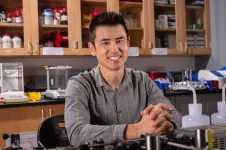(Press-News.org) INDIANAPOLIS, IND – The Canadian Cardiovascular Society (CCS) released the world’s first classification of acute myocardial infarction (AMI), or heart attack, based on heart tissue damage research that was driven by two cardiovascular investigators within the Ischemic Heart Disease Program of Krannert Cardiovascular Research Center (KCVRC) at Indiana University School of Medicine and Northern Ontario School of Medicine.
The four-stage classification, CCS-AMI, was presented at the Vascular 2023 conference on Oct. 29 in Montréal, Canada, and published in the Canadian Journal of Cardiology. With more than two decades of experience in myocardial infarction research, KCVRC Executive Director Rohan Dharmakumar, PhD and immediate past Chief of Cardiology and physician scientist Andreas Kumar, MD, from Northern Ontario School of Medicine, conceptualized the classification.
Working in collaboration with the CCS-AMI Writing Group, which comprised of an expert panel of cardiovascular specialists primarily from Canada and KCVRC physician scientist Keyur Vora, MD, FACC, the group developed the rationale and framework for the CCS-AMI Classification. The CCS-AMI Writing Group was endorsed by the CCS, chaired by Kumar and co-chaired by Dharmakumar and Michelle Graham, MD, president of CCS.
Clinical classifications are reviewed and developed by medical societies to introduce and adopt new standards of care and evolving guidelines. Knowing what level of tissue damage has occurred on the heart muscle can help cardiologists determine how best to redirect care to prevent a patient case from escalating, even with treatments available today.
CCS classifications have a rich history in cardiovascular care. CCS-AMI classification arrives nearly 50 years after the establishment of the CCS-Angina classification in 1972, which is widely used around the world to assess chest pain. Unlike CCS-Angina, which is based on clinical parameters, CCS-AMI uses a hybrid of clinical data and pathophysiology of heart muscle damage to characterize the level of injury following AMI.
Authors of the consensus paper say a classification that includes tissue-level changes is needed to leverage the “predictive power” of tissue damage to improve research and develop tissue-directed therapies for each stage.
“What we’ve learned over the past decade using advanced imaging is that when you open a blocked blood vessel of the heart, it can at times lead to substantially more tissue damage. On some patients, this can drive electrical instabilities (arrhythmias) or ventricular remodeling that can then lead to heart failure, hospitalization or death,” said Dharmakumar. “In manuscripts we published in 2022, we demonstrated that when there is a rupture of small vessels, which we call intramyocardial hemorrhage, it results in a vast number of cardiomyocytes dying that would otherwise have been saved by reperfusion therapy. We also show that when reperfusion therapy results in intramyocardial hemorrhage, the damaged area can be replaced by fatty tissue, weakening the heart and directing it towards heart failure.”
The CCS-AMI Classification outlines damage to the heart muscle following a heart attack in four progressively severe stages based on decades of research:
CCS Stage 1 Myocardial Infarction: Aborted Myocardial Infarction
CCS Stage 2 Myocardial Infarction: Cardiomyocyte necrosis without microvascular injury
CCS Stage 3 Myocardial Infarction: Cardiomyocyte necrosis and microvascular obstruction
CCS Stage 4 Acute Myocardial Infarction: Cardiomyocyte necrosis, microvascular obstruction and reperfusion hemorrhage
“The last two stages are directly associated with reperfusion injury and extensive tissue damage,” Dharmakumar said. “This classification establishes the crucial framework needed, so new therapies can be developed to maximize impact on patient outcomes. I am hopeful that CCS-AMI Classification will spur on new guidelines by various cardiovascular societies around the world, so cardiovascular patients everywhere can benefit from more tailored interventional cardiac care.”
Vora, who presented clinical cases to explore the diverse characteristics exhibited by Acute MI patients during the CCS-AMI Classification session at Vascular 2023, explains we now have a better understanding of myocardial infarction from the nature of the tissue injury following reperfusion.
“CCS-AMI Classification will drive new diagnostic and therapeutic clinical trialS to save patients suffering from CCS classifications of severe injury,” Vora said.
Kumar stated the classification is a game-changing tool that opens new avenues for patient risk assessment and future drug development in an easy, usable format.
“Not all heart attacks are the same,” Kumar said. “Patient risk assessment and future therapies will improve when the precise stage of tissue injury is considered.”
About IU School of Medicine
IU School of Medicine is the largest medical school in the U.S. and is annually ranked among the top medical schools in the nation by U.S. News & World Report. The school offers high-quality medical education, access to leading medical research and rich campus life in nine Indiana cities, including rural and urban locations consistently recognized for livability.
END
First clinical classification of heart attacks based on tissue damage adopted by Canadian Cardiovascular Society
Classification developed by researchers at Indiana University School of Medicine, Northern Ontario School of Medicine
2023-10-30
ELSE PRESS RELEASES FROM THIS DATE:
Microplastics’ shape determines how far they travel in the atmosphere
2023-10-30
ITHACA, N.Y. –Micron-size microplastic debris can be carried by the jet stream across oceans and continents, and their shape plays a crucial role in how far they travel.
A Cornell University collaboration has developed a model to simulate the atmospheric transport of microplastic fibers and shows that flat fibers travel farther in the lower atmosphere, and are more prevalent, than spherical fibers. Previous studies assumed these fibers to be spherical.
The modeling has the potential to help scientists determine the sources of the pervasive waste – which could inform policy efforts to reduce it.
The ...
Can personalized care prevent over screening for colorectal cancer in older adults?
2023-10-30
Colorectal cancer screening is widely recommended for adults ages 45 to 75 with an average risk of developing the disease. However, many people don’t realize that the benefits of screening for this type of cancer aren’t always the same for older adults.
“While many clinicians simply follow guideline recommendations for colon cancer screening in adults within this age range, this isn’t always the best approach,” said Sameer Saini, M.D., M.S., who is a gastroenterologist at both Michigan Medicine and the Lieutenant Colonel Charles S. Kettles VA Medical Center and is as a health ...
The Crab Nebula seen in new light by NASA's Webb
2023-10-30
NASA’s James Webb Space Telescope has gazed at the Crab Nebula, a supernova remnant located 6,500 light-years away in the constellation Taurus. Since the recording of this energetic event in 1054 CE by 11th-century astronomers, the Crab Nebula has continued to draw attention and additional study as scientists seek to understand the conditions, behavior, and after-effects of supernovae through thorough study of the Crab, a relatively nearby example.
Using Webb’s NIRCam (Near-Infrared Camera) and MIRI (Mid-Infrared Instrument), a team led by Tea Temim at Princeton University is searching for answers about the Crab Nebula’s ...
Roe v. Wade repeal impacts where young women choose to go to college, PSU researcher finds
2023-10-30
The impacts of Roe v. Wade's reversal in 2022 are still being understood, but new research from Portland State's Rajiv Sharma provides another piece of the puzzle.
Sharma found that in the wake of the U.S. Supreme Court's decision, female students are more likely to choose a university or college in states where abortion rights and access are upheld. The research, conducted with the Tulane University School of Public Health and Tropical Medicine, indicates a potential impact on future workforces and economic development ...
The American Heart Association joins consortium with full support for a new American Board of Cardiovascular Medicine
2023-10-30
DALLAS, Monday, October 30, 2023 – The national Board of Directors of the American Heart Association last week voted to provide full support to the House of Cardiology’s consortium proposal to create a new American Board of Cardiovascular Medicine (ABCVM) specifically to certify cardiovascular physicians. The proposal for the new ABCVM was announced on September 21, 2023 by the consortium of professional societies including the American College of Cardiology (ACC), the Heart Failure Society of America (HFSA), the Heart Rhythm ...
Amphibians have one more thing to worry about—mercury—large USGS study shows
2023-10-30
RESTON, Va. — The first widescale assessment of methylmercury in adult amphibians in the U.S. to date shows that, in amphibians, this toxic compound is common, widespread and, at least for some, can reach very high levels.
The study, “Broad-scale Assessment of Methylmercury in Adult Amphibians,” which published today in the journal Environmental Science and Technology, brought together scientists from around the country to test more than 3,200 amphibians representing 14 species from 26 populations.
“Amphibians ...
Most websites do not publish privacy policies, researchers say
2023-10-30
UNIVERSITY PARK, Pa. — Online privacy policies may not only be difficult to find but nonexistent, according to Penn State researchers who crawled millions of websites and found that only one-third of online organizations made their privacy policy available for review.
“Privacy Lost and Found: An Investigation at Scale of Web Privacy Policy Availability,” a paper authored by students and faculty from the Penn State College of Information Sciences and Technology (IST), detailed an analysis of the online privacy policy landscape and studied the unavailability of privacy policies on company domains. It received the Best Student Paper ...
A microscope that can monitor the development of the heart
2023-10-30
The ability to dynamically track the movement of cells is essential for modeling cellular interactions as they form organs such as the heart. But current microscope technology isn’t up to the task of capturing those movements.
Juhyun Lee, associate professor in the Bioengineering Department at The University of Texas at Arlington, recently received a five-year, $1.94 million grant from the National Institutes of Health to develop a 4D high-resolution imaging system to quantify cell tracking.
Traditional microscopes allow users to zoom in to view an individual cell. However, doing so obscures that cell’s relationship ...
A Google Slides extension can make presentation software more accessible for blind users
2023-10-30
Screen readers, which convert digital text to audio, can make computers more accessible to many disabled users — including those who are blind, low vision or dyslexic. Yet slideshow software, such as Microsoft PowerPoint and Google Slides, isn’t designed to make screen reader output coherent. Such programs typically rely on Z-order — which follows the way objects are layered on a slide — when a screen reader navigates through the contents. Since the Z-order doesn’t adequately convey how a slide is laid out in two-dimensional space, slideshow software can be inaccessible to people with disabilities.
A team led by researchers ...
Prisons vulnerable to natural disasters, but ill-prepared
2023-10-30
Three-quarters of Colorado prisons are likely to experience a natural disaster in the coming years, but due to aging infrastructure and outdated policies, many are ill-equipped to keep residents safe, suggests new CU Boulder research.
The study, published in the journal Natural Hazards Review, comes on the heels of one of the hottest summers on record and as U.S. lawmakers are calling for an investigation into a rash of what are believed to be heat-related deaths in the nation’s prisons.
In other research, including interviews and focus groups with 35 formerly incarcerated Coloradans, the researchers found that most had already suffered from climate-related hazards, experiencing ...
LAST 30 PRESS RELEASES:
Scientists show how to predict world’s deadly scorpion hotspots
ASU researchers to lead AAAS panel on water insecurity in the United States
ASU professor Anne Stone to present at AAAS Conference in Phoenix on ancient origins of modern disease
Proposals for exploring viruses and skin as the next experimental quantum frontiers share US$30,000 science award
ASU researchers showcase scalable tech solutions for older adults living alone with cognitive decline at AAAS 2026
Scientists identify smooth regional trends in fruit fly survival strategies
Antipathy toward snakes? Your parents likely talked you into that at an early age
Sylvester Cancer Tip Sheet for Feb. 2026
Online exposure to medical misinformation concentrated among older adults
Telehealth improves access to genetic services for adult survivors of childhood cancers
Outdated mortality benchmarks risk missing early signs of famine and delay recognizing mass starvation
Newly discovered bacterium converts carbon dioxide into chemicals using electricity
Flipping and reversing mini-proteins could improve disease treatment
Scientists reveal major hidden source of atmospheric nitrogen pollution in fragile lake basin
Biochar emerges as a powerful tool for soil carbon neutrality and climate mitigation
Tiny cell messengers show big promise for safer protein and gene delivery
AMS releases statement regarding the decision to rescind EPA’s 2009 Endangerment Finding
Parents’ alcohol and drug use influences their children’s consumption, research shows
Modular assembly of chiral nitrogen-bridged rings achieved by palladium-catalyzed diastereoselective and enantioselective cascade cyclization reactions
Promoting civic engagement
AMS Science Preview: Hurricane slowdown, school snow days
Deforestation in the Amazon raises the surface temperature by 3 °C during the dry season
Model more accurately maps the impact of frost on corn crops
How did humans develop sharp vision? Lab-grown retinas show likely answer
Sour grapes? Taste, experience of sour foods depends on individual consumer
At AAAS, professor Krystal Tsosie argues the future of science must be Indigenous-led
From the lab to the living room: Decoding Parkinson’s patients movements in the real world
Research advances in porous materials, as highlighted in the 2025 Nobel Prize in Chemistry
Sally C. Morton, executive vice president of ASU Knowledge Enterprise, presents a bold and practical framework for moving research from discovery to real-world impact
Biochemical parameters in patients with diabetic nephropathy versus individuals with diabetes alone, non-diabetic nephropathy, and healthy controls
[Press-News.org] First clinical classification of heart attacks based on tissue damage adopted by Canadian Cardiovascular SocietyClassification developed by researchers at Indiana University School of Medicine, Northern Ontario School of Medicine


